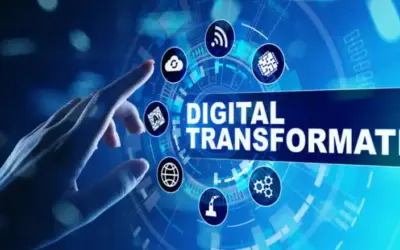Technology is evolving at lightning speed, and businesses must keep up to stay ahead of the game. Digital transformation trends are changing how companies operate, connect with customers, and drive innovation.
So, what are the latest digital transformation trends that will dominate 2025? Let’s dive into the biggest game-changers you should watch out for!
#7 Latest Digital Transformation Trends for 2025
Let’s explore the 7 most impactful digital transformation trends that are shaping the future. Whether you’re a startup or an enterprise, staying ahead of these innovations will be the key to long-term success. Let’s dive in!
#7. AI and Machine Learning
Artificial Intelligence (AI) and Machine Learning (ML) are no longer just fancy buzzwords—they’re the backbone of modern businesses. These technologies help companies automate tasks, improve decision-making, and personalize customer experiences.
How AI and ML Are Transforming Businesses?
- Smarter Chatbots: AI-powered chatbots provide 24/7 customer support, answering queries faster than ever.
- Predictive Analytics: Businesses use AI to forecast trends, helping them make data-driven decisions.
- AI in Healthcare: AI detects diseases early, leading to better treatments and patient care.
AI-powered tools like ChatGPT and Google Bard are making customer interactions smoother and more human-like.
Related: – Latest Predictive Analytics Trends and Innovations
#6. Cloud Computing and Edge Computing
The next digital transformation trends for 2025 are cloud and edge computing. Gone are the days of bulky servers. Cloud computing allows businesses to store, access, and manage data online, while edge computing processes data closer to where it’s created, reducing delays.
Why This Matters in 2025?
- Faster Processing: Edge computing speeds up real-time decision-making.
- Cost Savings: Cloud storage eliminates the need for expensive hardware.
- Better Security: Data is safer with advanced encryption and security measures.
Netflix uses cloud computing to deliver seamless streaming experiences to millions of users worldwide.
#5. Connectivity and Networks
With 5G and advanced networks, the world is becoming more connected than ever. Businesses are utilizing high-speed internet to enhance digital experiences.
Key Benefits of 5G and Advanced Networks
- Lightning-Fast Speed: Downloads and uploads are 100x faster than 4G.
- Seamless Remote Work: Teams can collaborate in real time without lag.
- Boost for IoT Devices: Smart homes and self-driving cars work more efficiently.
Smart cities use 5G to improve traffic management and public safety.
#4. Blockchain Technology
Blockchain is transforming industries by providing secure, transparent, and tamper-proof systems. While many associate it with Bitcoin, its applications go far beyond cryptocurrency.
How Blockchain Is Changing Businesses?
- Secure Transactions: Banks use blockchain to prevent fraud.
- Supply Chain Transparency: Companies track products from manufacturer to customer.
- Smart Contracts: Automated smart contracts execute themselves when conditions are met.
Walmart uses blockchain to track food safety and ensure fresh produce reaches consumers.
#3. Immersive Technologies
Augmented Reality (AR) and Virtual Reality (VR) are changing the way people interact with digital content. These technologies are widely used in gaming, shopping, and even job training.
Why Immersive Tech Is Booming?
- Better Shopping Experiences: Customers try products virtually before buying.
- Revolutionizing Education: VR-based learning makes education more interactive.
- Workplace Training: Companies train employees in simulated environments.
IKEA’s AR app lets users visualize furniture in their homes before making a purchase.
#2. Digital Twins
A digital twin is a virtual replica of a physical object, system, or process. Businesses use digital twins to simulate real-world scenarios before making big decisions.
How Digital Twins Benefit Businesses?
- Predictive Maintenance: Factories use digital twins to detect issues before breakdowns.
- Smart Cities: Urban planners use digital twins to design efficient cities.
- Healthcare Breakthroughs: Doctors practice surgeries on digital twin models.
Formula 1 teams use digital twins to simulate race car performance before hitting the track.
#1. Low-Code/No-Code Development
You no longer need to be a coding expert to create an app. Low-code and no-code platforms let anyone develop software using simple drag-and-drop tools.
Why This Trend Is Growing?
- Faster Development: Apps are built in days, not months.
- Cost-Effective: Companies save money on software development.
- Empowers Everyone: Even non-tech people can create digital solutions.
Canva’s no-code platform allows users to design graphics without advanced skills.
Must-Read: Digital Transformation Strategies for Small-Mid Sized Businesses (2025 Guide)
Final Thoughts!
As we enter 2025, the digital revolution is no longer a choice—it’s a necessity. The businesses that adapt, innovate, and evolve will lead the future, while those that hesitate risk being left behind. Will your company be a pioneer or a spectator?
Now is the moment to seize the opportunities, embrace the change, and future-proof your success. Start integrating these cutting-edge digital transformation trends today, because in the world of technology, tomorrow belongs to the bold.
Therefore, to stay up-to-date about latest trends and innovation in different industries, subscribe to our newsletter as well as explore insightful resources curated by the experts.
Frequently Asked Questions (FAQs)
1. What is the most important digital transformation trend for 2025?
AI and Machine Learning are the biggest drivers of digital transformation, revolutionizing industries with automation and predictive analytics.
2. How does blockchain contribute to digital transformation?
Blockchain enhances security, transparency, and efficiency in transactions, supply chains, and smart contracts.
3. What industries benefit the most from digital transformation?
Healthcare, finance, retail, manufacturing, and education are experiencing the most significant impact.
4. How can small businesses adopt digital transformation?
Small businesses can start by using cloud computing, automating tasks with AI, and utilizing low-code/no-code platforms for app development.







